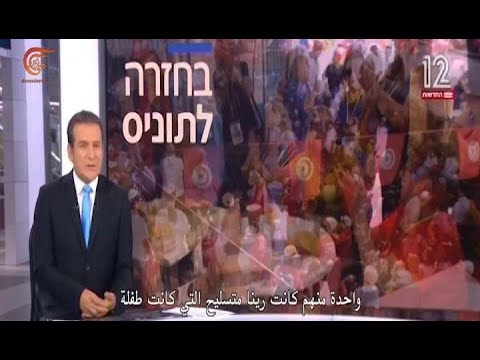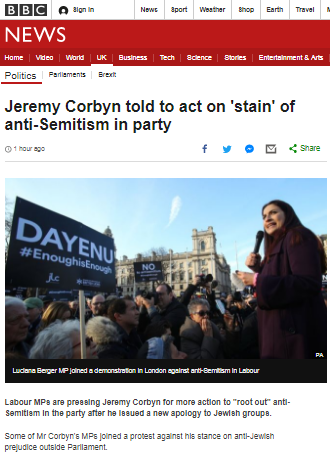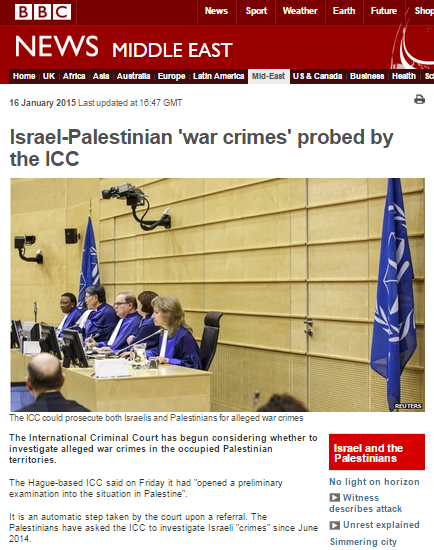This is the first in a series of posts by CAMERA Arabic showing how Arabic language channels belonging to Western media outlets frame the topic of Jews who originate from or live in the Middle East and North Africa by distinguishing ‘loyal’ Jews from ‘treacherous’ Zionists. All translations, emphasis and in-bracket remarks are by CAMERA Arabic unless otherwise specified.
“May God bless the soldiers of Israel […] may he shed his light on us, on Israel and on Tunisia, long live Israel and long live Tunisia!”
Those spontaneous words, originally an excited mixture of Hebrew and a colloquial dialect of Arabic, were chanted by a woman on a bus full of fellow tourist-pilgrims, with many others in the group cheering and responding to her wishes with “amen”. Most if not all of them were Jewish Israelis of Tunisian heritage. Their journey’s destination was the al-Ghriba synagogue, one of the oldest in the world, located on the Tunisian island of Djerba. Jews have been conducting an annual celebration there every Lag b‘Omer (which usually falls in May) for generations, and this year (2019) saw the number of pilgrims and visitors to the site exceeding all previous gatherings since the country underwent the Jasmine Revolution in January of 2011.
The entire trip was documented by Rina Matsliah, a well-known Israeli journalist who was born in Tunisia herself. It was her report that brought a seemingly marginal moment to the public eye: the enthusiastic woman and her group were shown for a few seconds in an evening news program on Israel’s Channel 12. The report also revealed to the viewers that the group had the opportunity to look from outside at the house near the capital Tunis where, in 1988, Israel had assassinated Yasser Arafat’s deputy, Khalil al-Wazir (a.k.a Abu Jihad) – one of Fatah’s leading terrorists and a man responsible for the murders of dozens of Israeli civilians.
That documentation of a group of Israeli tourists proudly praising Israel and its soldiers on Tunisian soil and later looking at a site where a prominent Palestinian leader was assassinated soon sparked a scandal in the North African country.
An Arabic subtitled version of the report was promoted by Hezbollah affiliated ‘al-Mayadeen’ channel, and demonstrations and sit-ins were subsequently held in front of government buildings in Tunisia. Under the accusation of “normalization” with the “Zionist entity”, the protesters specifically demanded the removal from office of René Trabelsi – Tunisia’s minister of tourism and the first Jew ever to be appointed minister in modern Tunisian history. Trabelsi is a member of a tiny Jewish community of no more than 2,500 people.
The story was reported widely on Arabic-speaking channels, including those belonging to Western media organisations. Some quoted Arab social media without fact-checking the preposterous claims raised there. For example, a television program produced by BBC Arabic uncritically amplified outraged comments which viewed the visit as a military act.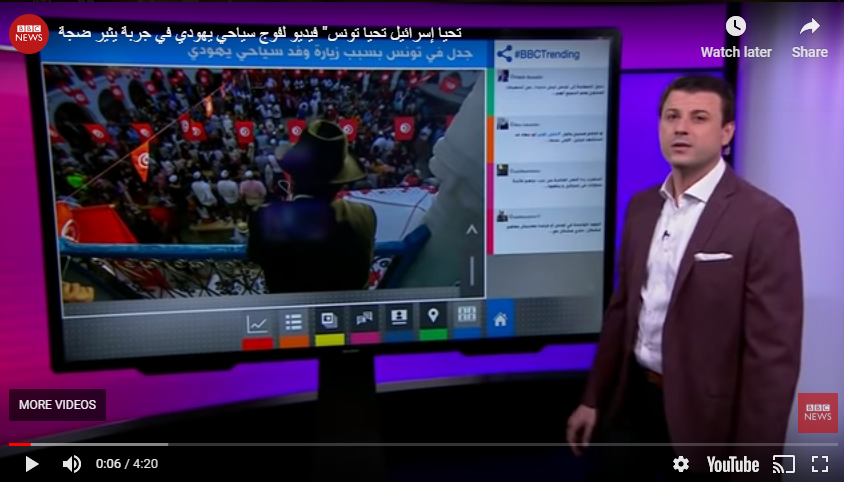
“If this is true, Khalil al-Wazir Abu Jihad became a martyr twice, the first time when Israel assassinated him in 1988 and the second when his killers visited the house where he became a martyr in Tunis” (2:11)
“I have no problem with Tunisian Jews in either Tunisia or France, I have a problem with the ‘Zionists’ who live in occupied Palestine, they’re all soldiers, whether on active duty or in the reserve forces, since military service is compulsory in the Zionist entity… I mean, [how can] we consider them tourists and their origin to be Tunisian!?” (2:26)
The BBC Arabic program also quoted an additional edited comment (1:54), by a Tunisian journalist who insisted there was nothing new about “Zionists” entering Tunisia.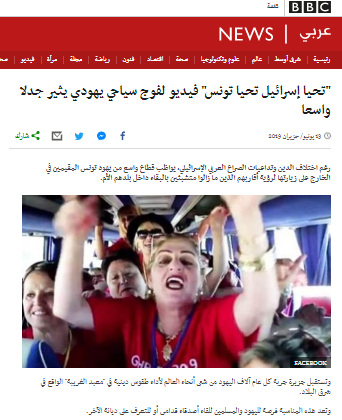
The online BBC report about the same story noted that the journalist, Habib Bouajila called for the sacking of Trabelsi in order to “protect Tunisian national dignity”. Bouajila accused Trabelsi of dangerously distorting facts and inflaming tensions between Sunnis and Shi’ites because the minister had pointed out al-Mayadeen’s affiliations with Hezbollah and claimed that the channel’s translation from Hebrew into Arabic was mistaken.
The full, unedited version of Boualija’s comment as embedded in a BBC Arabic webpage, is saturated with antisemitic tropes, undertones and dog-whistles. It views the incident as a new level in the prosecution of a conspiracy against the Tunisian people, involving Jews of many countries as well as Trabelsi himself (to whom he consistently refers by his Hebrew name Roni). The hateful comment concludes with death wishes to Israel and America.
“The admittance of Zionists into Tunisia is not new – since the nineties everybody knows they’re entering with their Zionist passports in tourist groups or, in rare occasions, with their second passports. [This is the case] as long as all the Zionist settlers, from the minister to the last occupier-usurper, retain their original nationality, or [obtain] a western nationality, such as most members of Jewish diasporas all over the world have. The Jews of Tunisia, previous or current, and those who left it for occupied Palestine, are no exception.
This is not what’s new – the new provocation is the boldness of Roni Trabelsi, who holds the tourism portfolio and in his last statement assumed the role[s] of the [entire] Tunisian diplomatic corps, the President of the Republic and the Parliament, so that he would decide on Tunisia’s alignments along the international axes. He also assumed the role of a media analyst [who specializes in] TV-stations and affiliations, in order to classify the al-Mayadeen channel as Lebanese Shi’ite […], despite [the fact] it was merely conveying and literally translating the report of the Zionist channel. On top of that, he arrogantly surmised the ratio of Tunisians who deplore his tendencies towards normalization and shamed with what he sees as ‘disgrace’, i.e. Shi’ization and siding with the Resistance [Hezbollah]…
The audacity of the minister stems from his (admittedly correct) estimation that he is stronger than the Tunisian government and state. In a Tunisian landscape that sets his path [forward] and promotes him to be a ‘high-ranked official’, Roni is the distinguished, the selected; he has more power and importance than all the ‘indigenous’, ‘gentile’ ministers and officials. It also derives from his (admittedly accurate) understanding that the straw man of ‘antisemitism’ and the allegations of bigotry, terrorism and assaulting ‘our Jewish brethren’ will deter the cowardly politicians, commentators and academics who want to stay where they are or aspire to move up the ladder. In [such] a Tunisian landscape Roni knows, and those who fear of Roni know, that his installment, as well as the installment of his minions [lit. players], is at the hand of the great supervisor, who loves Roni and loves those who love Roni and isolates whoever hates him.
Once again and forever, past, present and future, we say to Roni and his supervisor, and to whoever loves Roni and whoever acts obsequiously towards Roni and his supervisor, and [to whoever] wants to reposition Tunisia in service of Roni’s friends and entourage in a supine Arab world and international community [lit. landscape], we say: Tunisia is Arab – Its spirit is [of] resistance despite our setbacks and breakdowns – it belongs with its [Arab/Islamic] Ummah – its compass is Palestine – and its voice is loud and clear: death to Israel – death to America – and glory to the resistance… and whoever doesn’t like it can go drink the water of La Goulette [a city on the Tunisian Mediterranean coast]. He can present himself as an ‘outside observer’ [lit. a bird at the roof] or an alcohol merchant or a civil servant, [all are] typical hypocritical stories [dipped] in nostalgia [that is made out] of Zio-Masonic [sic] flour between al-Ghriba and the Bab Bahr Cathedral [a famous church in Tunis which represents to the writer a Tunisia that’s not exclusively Arab/Muslim, like al-Ghriba]. We do not buy this position in our homeland, treacherous as it is coming from its honey-tongued proponents…”
In addition BBC Arabic’s online report also brought comments from other Tunisians who, in BBC’s words,
“feared […] that the incident would reflect badly on the Jews of Tunisia, who rejected Israel’s temptations and have confirmed their clinging to their Tunisian roots.”
The protests eventually died out after the government responded by clarifying that none of the visitors has entered Tunisia under an Israeli passport. As for Trabelsi himself, he repeatedly denied any connection between Israelis who visit Tunisia and the perceived act of “normalization” that he was blamed for. In one interview, he also “firmly” condemned the tourists who, in his words, “celebrated the Israeli army on Tunisian soil.” Indeed, it seems that this time the Jewish minister has dodged the bullet. But as long as the debate that surrounds Jews who live in the Middle East is framed the way it is – framing that BBC Arabic obviously finds acceptable – it seems that he and his community will always be suspected of dual loyalty and will carry the burden of proof for their innocence.
Related Articles:
BBC whitewashes Islamist antisemitism with semantics
BBC whitewashes anti-Jewish extremism in Tunisia
Airbrushing terror: the BBC on Abu Jihad

